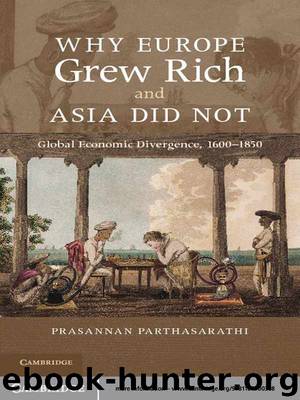Why Europe Grew Rich and Asia Did Not by Prasannan Parthasarathi

Author:Prasannan Parthasarathi [Parthasarathi, Prasannan]
Language: eng
Format: mobi
ISBN: 9781107000308
Publisher: Cambridge University Press
Published: 2011-07-26T16:00:00+00:00
From European to global science
Margaret Jacob and Joel Mokyr argue that the rise of science was crucial for the industrial development of Europe. For both authors, the essence of European science was the application of rationality in new ways, including experimentation, which methodically isolated a phenomenon for study, and the description of nature using the language of mathematics. Experimentation and mathematics came together in the work of Isaac Newton, who represented the pinnacle of early-modern European scientific achievement. The connection between Newtonian mechanics and industrialization is elusive, however, and numerous innovators had no rigorous scientific training, which Jacob recognizes. “If we go to the lead mines of Derbyshire, to the industrial center of economic development in the late eighteenth century, there too we find evidence of mechanical knowledge applied by mine owners who possessed no known formal or academic scientific education,” she writes.3 This is why Jacob appeals to a culture of science that informed the work of manufacturers and innovators and was vital for industrial development in Britain.
Mokyr attempts to make this scientific culture more precise and argues that eighteenth-century Europe experienced an Industrial Enlightenment which contributed to economic development in two ways. This Industrial Enlightenment, first, “sought to reduce access costs by surveying and cataloging artisanal practices . . . to determine which techniques were superior and to propagate them.” It then “sought to understand why techniques worked by generalizing them.”4 To generate these useful forms of knowledge, the Industrial Enlightenment relied upon experimentation and a scientific mentality, which “imbued engineers and inventors with a faith in the orderliness, rationality, and predictability of natural phenomena.”5
While Jacob does not transport her arguments beyond Europe, Mokyr argues that the useful knowledge generated by the Industrial Enlightenment explains the divergence between East and West. “The effective deployment of that knowledge, scientific or otherwise, in the service of production is the primary – if not the only – cause for the rapid growth of Western economies in past centuries,” Mokyr writes.6 “Nothing of the sort,” according to Mokyr, “can be detected at this time in the Ottoman Empire, Japan, India, Africa, or China.”7 This view of Europe as exceptional is consistent with Mokyr's earlier work on the history of technology, where he concluded that “by 1750, Europe had consolidated its technological superiority over the rest of the world. From the Bosporus to Tokyo Bay, the Oriental empires were falling behind by isolating themselves from the West and experiencing a slowdown in their own technological progress.”8
Mokyr makes these claims about the uniqueness of Europe, but on the basis of very little engagement with the history of science and technology for any region of Asia in the seventeenth and eighteenth centuries. The conventional wisdom among economic historians of Europe is that these areas of the world had little to offer by way of scientific or technical knowledge. David Landes is typical. On India, he writes, “Indian society did not know technological change.”9 On China, “Along with indifference to technology went resistance to European science.”
Download
This site does not store any files on its server. We only index and link to content provided by other sites. Please contact the content providers to delete copyright contents if any and email us, we'll remove relevant links or contents immediately.
International Integration of the Brazilian Economy by Elias C. Grivoyannis(110054)
The Radium Girls by Kate Moore(12018)
Turbulence by E. J. Noyes(8040)
Nudge - Improving Decisions about Health, Wealth, and Happiness by Thaler Sunstein(7692)
The Black Swan by Nassim Nicholas Taleb(7106)
Rich Dad Poor Dad by Robert T. Kiyosaki(6612)
Pioneering Portfolio Management by David F. Swensen(6288)
Man-made Catastrophes and Risk Information Concealment by Dmitry Chernov & Didier Sornette(6005)
Zero to One by Peter Thiel(5786)
Secrecy World by Jake Bernstein(4741)
Millionaire: The Philanderer, Gambler, and Duelist Who Invented Modern Finance by Janet Gleeson(4465)
The Age of Surveillance Capitalism by Shoshana Zuboff(4275)
Skin in the Game by Nassim Nicholas Taleb(4239)
The Money Culture by Michael Lewis(4198)
Bullshit Jobs by David Graeber(4179)
Skin in the Game: Hidden Asymmetries in Daily Life by Nassim Nicholas Taleb(3989)
The Dhandho Investor by Mohnish Pabrai(3758)
The Wisdom of Finance by Mihir Desai(3734)
Blockchain Basics by Daniel Drescher(3574)
